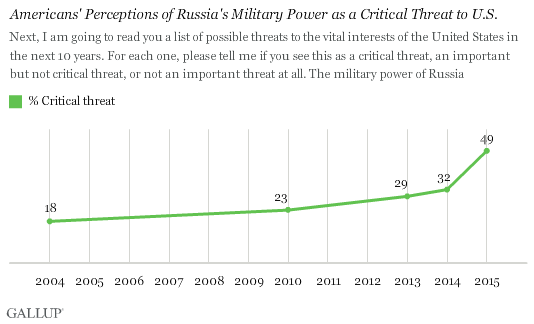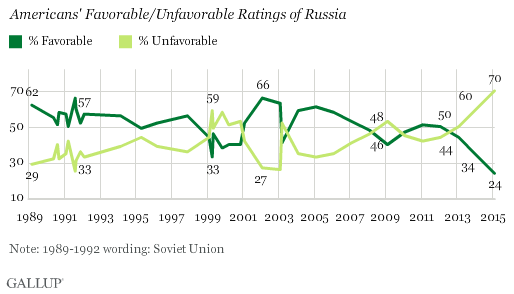Story Highlights
- Russia edges out North Korea as perceived top U.S. enemy
- Favorable ratings of Russia sink to 24%
- More Americans view Russian military power as critical threat
PRINCETON, N.J. -- Russia now edges out North Korea as the country Americans consider the United States' greatest enemy. Two years ago, only 2% of Americans named Russia, but that increased to 9% in 2014 as tensions between Russia and the U.S. increased, and now sits at 18%.
![What one country anywhere in the world do you consider to be the United States’ greatest enemy today? [OPEN-ENDED] 2011-2015 trend](http://content.gallup.com/origin/gallupinc/GallupSpaces/Production/Cms/POLL/jzakle_nv0ospcj277xhqw.png)
The results are based on a Feb. 8-11 Gallup poll, completed just before the international community brokered a cease-fire agreement between Ukraine and pro-Russian separatists in the country's east region. European leaders had hoped to reach an agreement to head off the possibility that the United States would send weapons and military equipment to Ukrainian military forces.
As Russia has risen in the "enemy" rankings, the two countries that topped the list in the previous three updates -- China in 2014 and Iran in 2011 and 2012 -- have slipped. The percentage mentioning China has dropped eight points over the past year, to 12%, and the percentage mentioning Iran has fallen seven points to 9%.
Nearly Half Now See Russian Military Power as Threat to U.S.
Americans have also become significantly more likely to view Russia's military power as a critical threat to the U.S. -- 49% now hold this view, compared with 32% a year ago.

Another 41% currently view Russia's military power as an important, but not critical, threat, down from 49% last year. Seven percent do not consider Russia a threat, down from 17% in 2014.
Despite the increase in perceptions of Russia's military power as a critical threat, the issue still is rated well behind other international challenges such as terrorism generally, the ISIS group specifically, and Iran's development of nuclear weapons.
Favorable Ratings of Russia Tumble
Americans' basic views of Russia are the worst Gallup has measured in its 26-year trend, with 24% having favorable and 70% unfavorable views. Russia's favorable rating has declined 10 points in each of the last two years. Just three years ago, Americans' views of Russia were more positive than negative.

Gallup's trend on ratings of Russia began as the Cold War was ending, and has fluctuated a great deal over its 26 years. For most of that time, Americans have been more positive than negative toward Russia. The major exceptions were during and shortly after the Kosovo situation in 1999, when the U.S. and Russia were at odds over the NATO-led bombing campaign against the Yugoslavians. That included the prior low point in Americans' views of Russia, a 33% favorable rating in April 1999.
Americans' views of Russia also turned more negative just before the start of the 2003 Iraq war, given Russia's opposition to the United States' planned military action, and again after the Russia-Georgia war in 2008. Shortly after coming into office in early 2009, the Obama administration tried to repair relations, with then-Secretary of State Hillary Clinton famously giving her Russian counterpart the gift of a "reset button."
Americans' ratings of Russian President Vladimir Putin are even worse than their ratings of the country more generally, as 13% have a favorable and 72% an unfavorable view of Putin. Putin's favorable ratings are similar to what Gallup measured last March, but are down a bit from earlier readings in his second presidential administration, and well below what they were in his first administration from 2000-2008.
Implications
Recent U.S.-Russia foreign policy disagreements, including the situation in Ukraine, have taken a toll on U.S.-Russia relations as well as on Americans' opinions of Russia. Americans increasingly see Russia's military power as a threat to the United States, rate Russia the worst they have since the Cold War ended and are more likely to name Russia as the United States' greatest enemy over any other country, including long-standing U.S. foes such as North Korea and Iran.
The feeling appears to be mutual, given that a Gallup World Poll survey of Russians conducted from April-June 2014 found 4% of Russians approving and 82% disapproving of U.S. leadership.
However, because Americans' attitudes about Russia have changed substantially in the past and have been quite positive at times -- which has not been the case for countries such as Iran, Iraq and North Korea -- if Russian and American policy interests find more common ground, Americans' views of Russia could recover quickly.
Survey Methods
Results for this Gallup poll are based on telephone interviews conducted Feb. 8-11, 2015, with a random sample of 837 adults, aged 18 and older, living in all 50 U.S. states and the District of Columbia. For results based on the total sample of national adults, the margin of sampling error is ±4 percentage points at the 95% confidence level. All reported margins of sampling error include computed design effects for weighting.
Each sample of national adults includes a minimum quota of 50% cellphone respondents and 50% landline respondents, with additional minimum quotas by time zone within region. Landline and cellular telephone numbers are selected using random-digit-dial methods.
View survey methodology, complete question responses, and trends.
Learn more about how Gallup Poll Social Series works.

